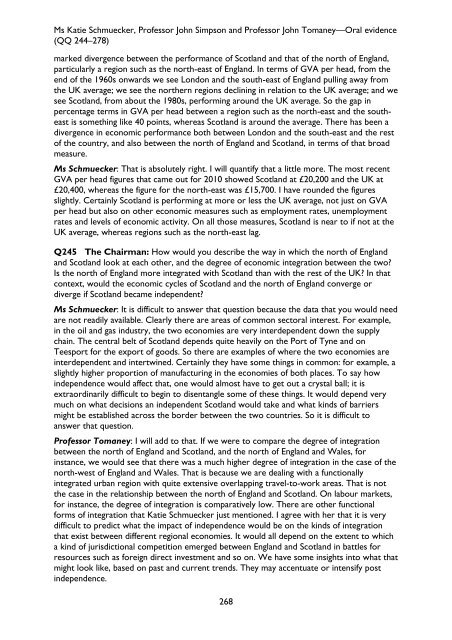SELECT COMMITTEE ON ECONOMIC AFFAIRS - Parliament
SELECT COMMITTEE ON ECONOMIC AFFAIRS - Parliament
SELECT COMMITTEE ON ECONOMIC AFFAIRS - Parliament
You also want an ePaper? Increase the reach of your titles
YUMPU automatically turns print PDFs into web optimized ePapers that Google loves.
Ms Katie Schmuecker, Professor John Simpson and Professor John Tomaney—Oral evidence<br />
(QQ 244–278)<br />
marked divergence between the performance of Scotland and that of the north of England,<br />
particularly a region such as the north-east of England. In terms of GVA per head, from the<br />
end of the 1960s onwards we see London and the south-east of England pulling away from<br />
the UK average; we see the northern regions declining in relation to the UK average; and we<br />
see Scotland, from about the 1980s, performing around the UK average. So the gap in<br />
percentage terms in GVA per head between a region such as the north-east and the southeast<br />
is something like 40 points, whereas Scotland is around the average. There has been a<br />
divergence in economic performance both between London and the south-east and the rest<br />
of the country, and also between the north of England and Scotland, in terms of that broad<br />
measure.<br />
Ms Schmuecker: That is absolutely right. I will quantify that a little more. The most recent<br />
GVA per head figures that came out for 2010 showed Scotland at £20,200 and the UK at<br />
£20,400, whereas the figure for the north-east was £15,700. I have rounded the figures<br />
slightly. Certainly Scotland is performing at more or less the UK average, not just on GVA<br />
per head but also on other economic measures such as employment rates, unemployment<br />
rates and levels of economic activity. On all those measures, Scotland is near to if not at the<br />
UK average, whereas regions such as the north-east lag.<br />
Q245 The Chairman: How would you describe the way in which the north of England<br />
and Scotland look at each other, and the degree of economic integration between the two?<br />
Is the north of England more integrated with Scotland than with the rest of the UK? In that<br />
context, would the economic cycles of Scotland and the north of England converge or<br />
diverge if Scotland became independent?<br />
Ms Schmuecker: It is difficult to answer that question because the data that you would need<br />
are not readily available. Clearly there are areas of common sectoral interest. For example,<br />
in the oil and gas industry, the two economies are very interdependent down the supply<br />
chain. The central belt of Scotland depends quite heavily on the Port of Tyne and on<br />
Teesport for the export of goods. So there are examples of where the two economies are<br />
interdependent and intertwined. Certainly they have some things in common: for example, a<br />
slightly higher proportion of manufacturing in the economies of both places. To say how<br />
independence would affect that, one would almost have to get out a crystal ball; it is<br />
extraordinarily difficult to begin to disentangle some of these things. It would depend very<br />
much on what decisions an independent Scotland would take and what kinds of barriers<br />
might be established across the border between the two countries. So it is difficult to<br />
answer that question.<br />
Professor Tomaney: I will add to that. If we were to compare the degree of integration<br />
between the north of England and Scotland, and the north of England and Wales, for<br />
instance, we would see that there was a much higher degree of integration in the case of the<br />
north-west of England and Wales. That is because we are dealing with a functionally<br />
integrated urban region with quite extensive overlapping travel-to-work areas. That is not<br />
the case in the relationship between the north of England and Scotland. On labour markets,<br />
for instance, the degree of integration is comparatively low. There are other functional<br />
forms of integration that Katie Schmuecker just mentioned. I agree with her that it is very<br />
difficult to predict what the impact of independence would be on the kinds of integration<br />
that exist between different regional economies. It would all depend on the extent to which<br />
a kind of jurisdictional competition emerged between England and Scotland in battles for<br />
resources such as foreign direct investment and so on. We have some insights into what that<br />
might look like, based on past and current trends. They may accentuate or intensify post<br />
independence.<br />
268

















